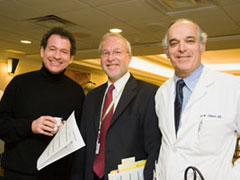Heart Felt
By Laura Pratt
The Schulich Heart Program Research Day: Research in Translation, held on November 14, was, by all accounts, a hearty success. The seats of Jenkin Auditorium were filled over the course of the day-long event with more than 100 earnest scholars, clinicians and students of the heart, all of them leaning into the gust of knowledge blowing outward from the podium.
The event, the second annual, was mounted to celebrate scientists' evolving understanding of how to diagnose and treat cardiovascular irregularities and disease.
It opened with messages of welcome from Dr. Brian Gilbert, chief of the Schulich Heart Program, and Barry McLellan, president and CEO of Sunnybrook, followed by Dr. Michael Julius, vice-president of research at Sunnybrook, and Dr. Graham Wright, senior scientist and director of the Schulich Heart Research Program at Sunnybrook.
The day unfolded with talks by researchers, including Dr. Alexander Dick, a cardiologist, scientist at Sunnybrook Research Institute and director of the Imaging Research Centre for Cardiac Intervention, which was launched officially at last year's research day. He summarized new developments and applications of ultrasound and magnetic resonance imaging, a talk with direct relevance to issues raised in the second session about the implications of diabetes on restenosis, kidney function and heart failure as discussed by Drs. Bradley Strauss and Sheldon Tobe, Sunnybrook clinicians and researchers, and Dr. Richard Gilbert, a researcher at St. Michael's Hospital.
The talk by Sunnybrook interventional cardiologist Dr. Mina Madan highlighted the challenges in new drug therapies associated with acute myocardial infarction, where one may need to trade off the risks of a subsequent heart attack against those of a major bleed.
Sunnybrook's Dr. Dennis Ko spoke about stents (small tubes that hold an artery open to allow blood flow) that contain drugs and their proven effectiveness in Ontario for reducing postoperative problems for heart patients, a subject with immediate implications for clinical practice.
"I very much enjoyed the day," says Dr. Graham Wright, who delivered the closing remarks. "There are clearly many opportunities to improve patient outcomes through more accurate assessment of cardiovascular disease and exploitation of this knowledge to tailor treatments. I hope a result of the day's activities will be heightened collaborations among basic researchers and clinicians to realize these goals."
PDF / View full media release »





